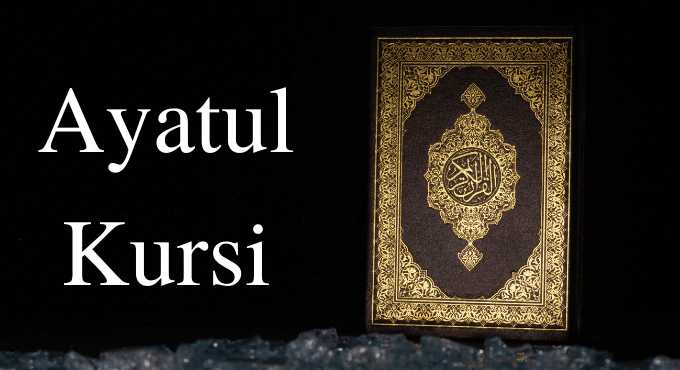Aslamu Alaikum Dear readers, today I will discuss what is Ayatul Kursi, Ayatul Kursi In English, Virtue of Ayatul Kursi, Meaning of Ayatul Kursi, Ayatul Kursi in Arabic, Brief Explanation of Ayatul Kursi, Importance of Ayatul Kursi, etc. Let’s find out…
Ayatul Kursi:
Ayat al-Kursi (Arabic: آية الكرسي ايات الكورسي, meaning: “Verse of the Throne”) is the 255th verse of the second Sura al-Baqarah (2:255) of the Qur’an. This verse declares Allah’s absolute power over the entire universe and cites how nothing or no one is considered comparable to Allah.
The verse is widely read and memorized in the Islamic world. Islamic scholars claim it as ‘the greatest verse of the Qur’an’. Muslims believe that reciting it brings numerous benefits and virtues. This verse is also used to ward off evil spirits or jinns.
Ubai bin Ka’b Radiyallahu Tayala Anhu said, The Messenger of Allah, may God bless him and grant him peace, asked him, “Which verse of the Qur’an is the best in your eyes?” He said, Allahu La Ilaha Illa Hual Hayyul Qayyum or Ayatul Kursi. Then the Messenger of Allah, may God bless him and grant him peace, gently hit his chest with his hand and said, Abul Munjir! Blessed are you because of this knowledge. (Muslim, Hadith, 1396)
The reason for the virtue of Ayatul Kursi is that this verse contains 10 sentences describing the Oneness of Allah and its attributes. And this verse is also very effective to be free from the influence of Satan.
In another hadith about the virtues of Ayatul Kursi, it is narrated from Hazrat Abu Umamah Radiyallahu Tayala Anhu, that the Messenger of Allah, may God bless him and grant him peace, said, ‘Whoever recites Ayatul Kursi after every obligatory prayer, there will be no obstacle to his entry into Paradise except death. (Nasa’i, Hadith, 9448; Tabarani, Hadith, 7832)
Ayatul Kursi in Arabic:
اَللهُ لآ إِلهَ إِلاَّ هُوَ الْحَىُّ الْقَيُّوْمُ، لاَ تَأْخُذُهُ سِنَةٌ وَّلاَ نَوْمٌ، لَهُ مَا فِى السَّمَاوَاتِ وَمَا فِى الْأَرْضِ، مَنْ ذَا الَّذِىْ يَشْفَعُ عِنْدَهُ إِلاَّ بِإِذْنِهِ، يَعْلَمُ مَا بَيْنَ أَيْدِيْهِمْ وَمَا خَلْفَهُمْ وَلاَ يُحِيْطُوْنَ بِشَيْئٍ مِّنْ عِلْمِهِ إِلاَّ بِمَا شَآءَ، وَسِعَ كُرْسِيُّهُ السَّمَاوَاتِ وَالْأَرْضَ، وَلاَ يَئُودُهُ حِفْظُهُمَا وَ هُوَ الْعَلِيُّ الْعَظِيْمُ-
Ayatul Kursi In English:
Allahu la ila-ha illa huwal hayyul qayyum, la ta’khujuhu sinatuno wala naum. Lahu ma-fissama-wa-ti wama fil ardv. Maan Jallaji Yashfa’u Indahu Illa Biijnihi. Ya’lamu ma baina aidihim wama khalfahum. Wala yuhituna bishaiim min ilmihi illa bima- shaa. Wasi’a Kursiyuhus Sama-Wati Wal Ardv. Wala Yaduhu Hifjuhuma Wa Hual Aliyul Azim.
Meaning of Ayatul Kursi:
Allah, besides whom there is no god. Who is eternal and the bearer of universal character. Neither drowsiness nor sleep can overtake him. Everything in the heavens and the earth belongs to Him. Who is there who can intercede for Him without His command? He knows everything before and behind them. From His ocean of knowledge they can master nothing, except as much as He wills to give. His throne encompasses the entire heavens and the earth. And supervising them does not tire him at all. He is supreme and great.
Virtues of Ayatul Kursi:
On the authority of Abu Umama (RA), the Prophet (PBUH) said, “Whoever recites Ayatul Kursi after every obligatory prayer, nothing will prevent him from entering Jannah except death.”
(Nasai Kubra 9928). On the authority of Ubai Ibnu Ka’b (RA), he said, The Messenger of Allah (PBUH) said, O Abul Munzeer! Which verse of the Book of Allah is the most prestigious to you? I said, Allah and His Messenger know best. He said again, O Abul Munzeer! Which verse of the Book of Allah is the most prestigious to you? I said, ‘Allahu la ilaha illa hual hiyyul qayyum’ (Ayatul Kursi). Then he struck my chest (lightly) and said, O Abul Munzeer! May your knowledge be joyful. (Sunan Abu Dawud-1460).
On the authority of Abu Huraira (R.A.), he said, “The Messenger of Allah (S.A.W.) said, ‘Every object has a peak.’ The highest peak of the Quran is Surah Al-Baqarah. It contains a verse which is the chief verse of the Qur’an. That is Ayatul Kursi. (Jame at-Tirmidhi-2878).
On the authority of Abu Laila (RA), he said, “While I was sitting near the Prophet (PBUH), a Bedouin came to him and said, ‘I have a sick brother.’ He said, what disease is your brother? He said, the evil effect (of something). He said you go and bring him to me. Abu Laila (RA) said, When he went and brought his brother, he made him sit in front of him. I heard that he recited Surah Fatiha, the first four verses of Surah Baqarah, the middle two verses (verses 163-164), Ayat al-Kursi (verse 255) and the last three verses of Surah Baqarah (verses 284-286) and one verse of Al-Imran, in my mind. Either he read verse 18 and one verse of Surah A’raf (verse 54), one verse of Surah Mu’minun (verse 117), one verse of Surah Jinn (verse 3), the first ten verses of Surah Saffat, the last three of Surah Hashar (22 , 23 and 24) recited the verses, Surah Ikhlas, Surah Falaq and Surah Nas and blew him. Then the Bedouin recovered in such a way that no disease remained of him (Sunan Ibn Majah-3549).
Brief explanation of Ayatul Kursi:
The very beginning of this verse states that there is none worthy of worship except Allah. Then the attributes of Allah are described. By the word اَلْـحَيُّ it is conveyed that He is always alive (Chiranjeev). The word قَيُّوْمُ has two meanings, one is the Eternal, the other is the Sustainer of all things, i.e. He subsists and controls others from existing. Then it is said that he cannot be touched by drowsiness and sleep, that is, the control of the universe does not tire him. The next part says, Allah is the Owner of everything in the heavens and the earth and no one has the right to object to anything He does. No one has the power to intercede with Him without His permission. It has been said that Allah is aware of all situations and events before and after. To say forward and backward may mean that Allah knows all the conditions and events before and after their birth. Or it may mean that ‘fore’ means that which is visible to man, and ‘back’ means that which is not visible or hidden. To whom Allah bestows knowledge, he receives only that much. In the next part it is said that His Kursi or Throne is so big that it encompasses the entire sky and the earth. It is easy for Him to maintain these two great creations and the heavens and the earth. In the last part Allah is called “the Most High”.
Importance of Ayatul Kursi:
According to the hadith, Ayatul Kursi is considered as the greatest verse of the Quran. The verse is considered one of the most powerful verses in the Quran because when one recites it, it is believed to confirm the greatness of Allah. Whoever recites this verse morning and evening will be protected by Allah from the evils of jinn and devils; It is also known as Daily Adhar. It is used in exorcism to ward off and protect from jinn and devils. Since it is believed that the verse provides spiritual or physical protection, it is often recited by Muslims before setting out on a journey and before going to sleep. The verse is also used for protection and survival from khabis (sexual harassment by jinn) for the whole day. Reciting the verse after every prayer is believed to lead to entry into Paradise.
At last:
May Allah Ta’ala enable all the Muslim Ummah to pay attention to prayer. Free me from pomp, laziness, carelessness. Amin!


